Entrepreneurship and Small Business Management Report
VerifiedAdded on 2020/12/09
|17
|5387
|127
Report
AI Summary
This report provides a comprehensive analysis of entrepreneurship and small business management, covering various venture types, their impact on the economy, and the traits and skills of successful entrepreneurs. It examines the role of micro and small businesses in job creation and innovation, explores the entrepreneurial mindset, and draws insights from the experiences of prominent entrepreneurs like Bill Gates and Steve Jobs.
Contribute Materials
Your contribution can guide someone’s learning journey. Share your
documents today.

Entrepreneurship
and
small-business
Management
and
small-business
Management
Secure Best Marks with AI Grader
Need help grading? Try our AI Grader for instant feedback on your assignments.
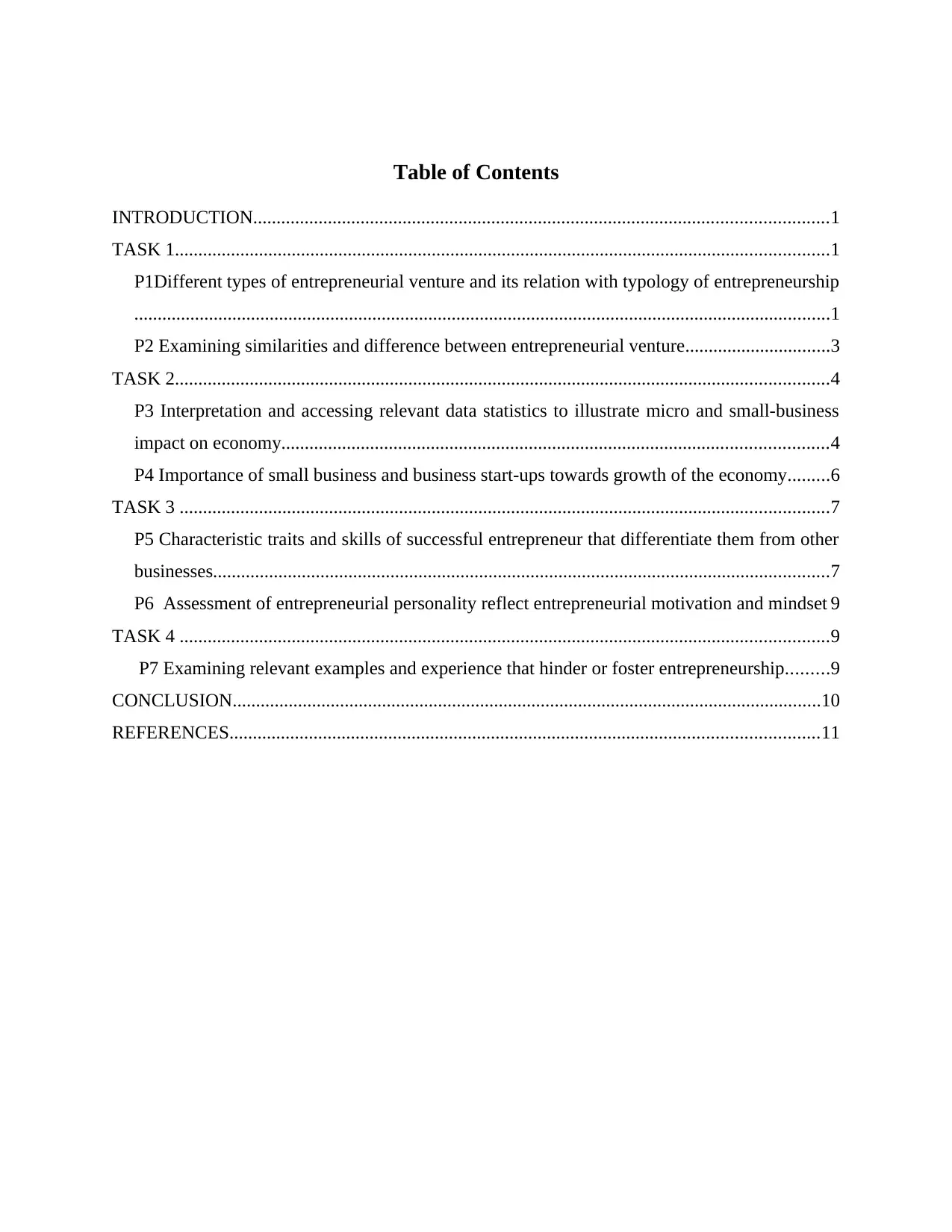
Table of Contents
INTRODUCTION...........................................................................................................................1
TASK 1............................................................................................................................................1
P1Different types of entrepreneurial venture and its relation with typology of entrepreneurship
.....................................................................................................................................................1
P2 Examining similarities and difference between entrepreneurial venture...............................3
TASK 2............................................................................................................................................4
P3 Interpretation and accessing relevant data statistics to illustrate micro and small-business
impact on economy.....................................................................................................................4
P4 Importance of small business and business start-ups towards growth of the economy.........6
TASK 3 ...........................................................................................................................................7
P5 Characteristic traits and skills of successful entrepreneur that differentiate them from other
businesses....................................................................................................................................7
P6 Assessment of entrepreneurial personality reflect entrepreneurial motivation and mindset 9
TASK 4 ...........................................................................................................................................9
P7 Examining relevant examples and experience that hinder or foster entrepreneurship.........9
CONCLUSION..............................................................................................................................10
REFERENCES..............................................................................................................................11
INTRODUCTION...........................................................................................................................1
TASK 1............................................................................................................................................1
P1Different types of entrepreneurial venture and its relation with typology of entrepreneurship
.....................................................................................................................................................1
P2 Examining similarities and difference between entrepreneurial venture...............................3
TASK 2............................................................................................................................................4
P3 Interpretation and accessing relevant data statistics to illustrate micro and small-business
impact on economy.....................................................................................................................4
P4 Importance of small business and business start-ups towards growth of the economy.........6
TASK 3 ...........................................................................................................................................7
P5 Characteristic traits and skills of successful entrepreneur that differentiate them from other
businesses....................................................................................................................................7
P6 Assessment of entrepreneurial personality reflect entrepreneurial motivation and mindset 9
TASK 4 ...........................................................................................................................................9
P7 Examining relevant examples and experience that hinder or foster entrepreneurship.........9
CONCLUSION..............................................................................................................................10
REFERENCES..............................................................................................................................11
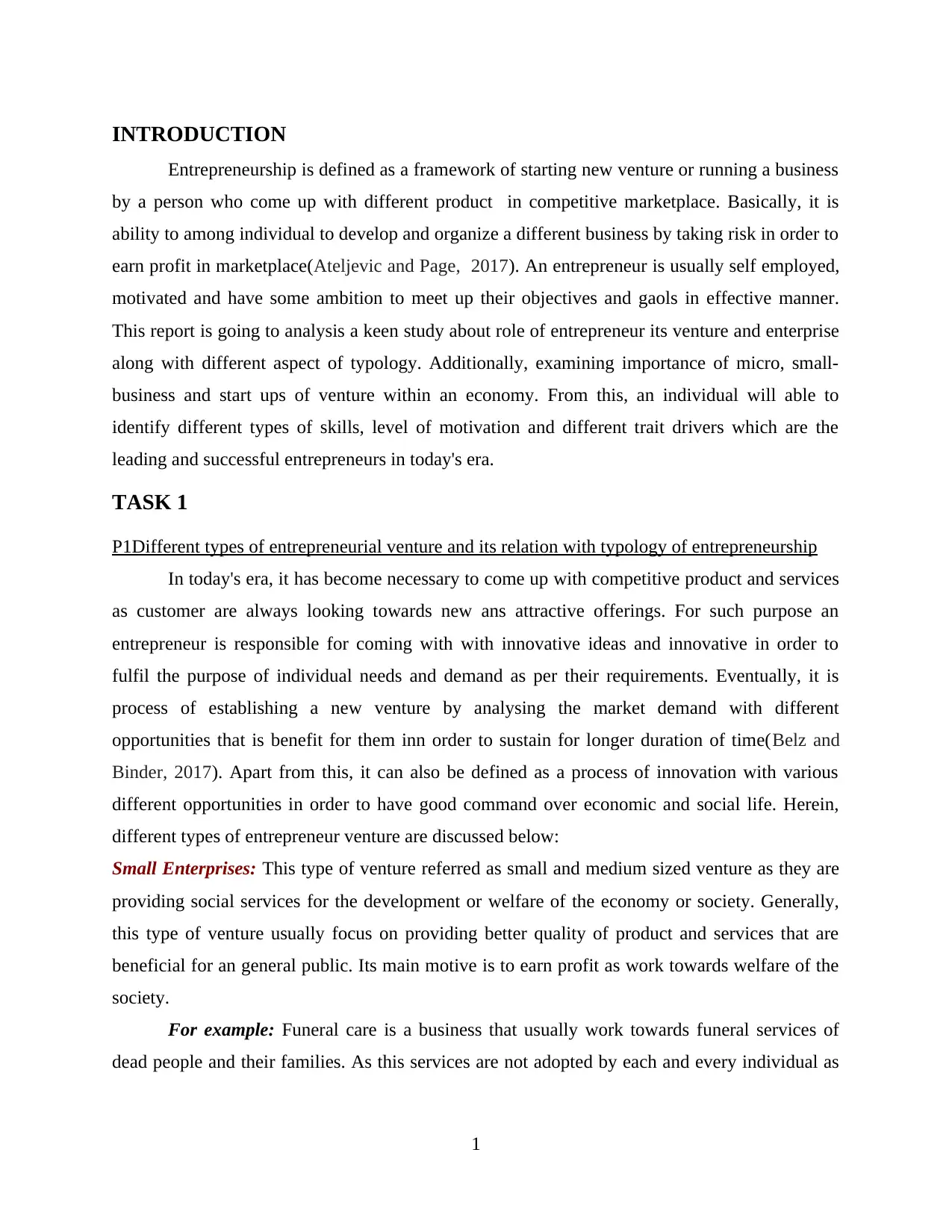
INTRODUCTION
Entrepreneurship is defined as a framework of starting new venture or running a business
by a person who come up with different product in competitive marketplace. Basically, it is
ability to among individual to develop and organize a different business by taking risk in order to
earn profit in marketplace(Ateljevic and Page, 2017). An entrepreneur is usually self employed,
motivated and have some ambition to meet up their objectives and gaols in effective manner.
This report is going to analysis a keen study about role of entrepreneur its venture and enterprise
along with different aspect of typology. Additionally, examining importance of micro, small-
business and start ups of venture within an economy. From this, an individual will able to
identify different types of skills, level of motivation and different trait drivers which are the
leading and successful entrepreneurs in today's era.
TASK 1
P1Different types of entrepreneurial venture and its relation with typology of entrepreneurship
In today's era, it has become necessary to come up with competitive product and services
as customer are always looking towards new ans attractive offerings. For such purpose an
entrepreneur is responsible for coming with with innovative ideas and innovative in order to
fulfil the purpose of individual needs and demand as per their requirements. Eventually, it is
process of establishing a new venture by analysing the market demand with different
opportunities that is benefit for them inn order to sustain for longer duration of time(Belz and
Binder, 2017). Apart from this, it can also be defined as a process of innovation with various
different opportunities in order to have good command over economic and social life. Herein,
different types of entrepreneur venture are discussed below:
Small Enterprises: This type of venture referred as small and medium sized venture as they are
providing social services for the development or welfare of the economy or society. Generally,
this type of venture usually focus on providing better quality of product and services that are
beneficial for an general public. Its main motive is to earn profit as work towards welfare of the
society.
For example: Funeral care is a business that usually work towards funeral services of
dead people and their families. As this services are not adopted by each and every individual as
1
Entrepreneurship is defined as a framework of starting new venture or running a business
by a person who come up with different product in competitive marketplace. Basically, it is
ability to among individual to develop and organize a different business by taking risk in order to
earn profit in marketplace(Ateljevic and Page, 2017). An entrepreneur is usually self employed,
motivated and have some ambition to meet up their objectives and gaols in effective manner.
This report is going to analysis a keen study about role of entrepreneur its venture and enterprise
along with different aspect of typology. Additionally, examining importance of micro, small-
business and start ups of venture within an economy. From this, an individual will able to
identify different types of skills, level of motivation and different trait drivers which are the
leading and successful entrepreneurs in today's era.
TASK 1
P1Different types of entrepreneurial venture and its relation with typology of entrepreneurship
In today's era, it has become necessary to come up with competitive product and services
as customer are always looking towards new ans attractive offerings. For such purpose an
entrepreneur is responsible for coming with with innovative ideas and innovative in order to
fulfil the purpose of individual needs and demand as per their requirements. Eventually, it is
process of establishing a new venture by analysing the market demand with different
opportunities that is benefit for them inn order to sustain for longer duration of time(Belz and
Binder, 2017). Apart from this, it can also be defined as a process of innovation with various
different opportunities in order to have good command over economic and social life. Herein,
different types of entrepreneur venture are discussed below:
Small Enterprises: This type of venture referred as small and medium sized venture as they are
providing social services for the development or welfare of the economy or society. Generally,
this type of venture usually focus on providing better quality of product and services that are
beneficial for an general public. Its main motive is to earn profit as work towards welfare of the
society.
For example: Funeral care is a business that usually work towards funeral services of
dead people and their families. As this services are not adopted by each and every individual as
1
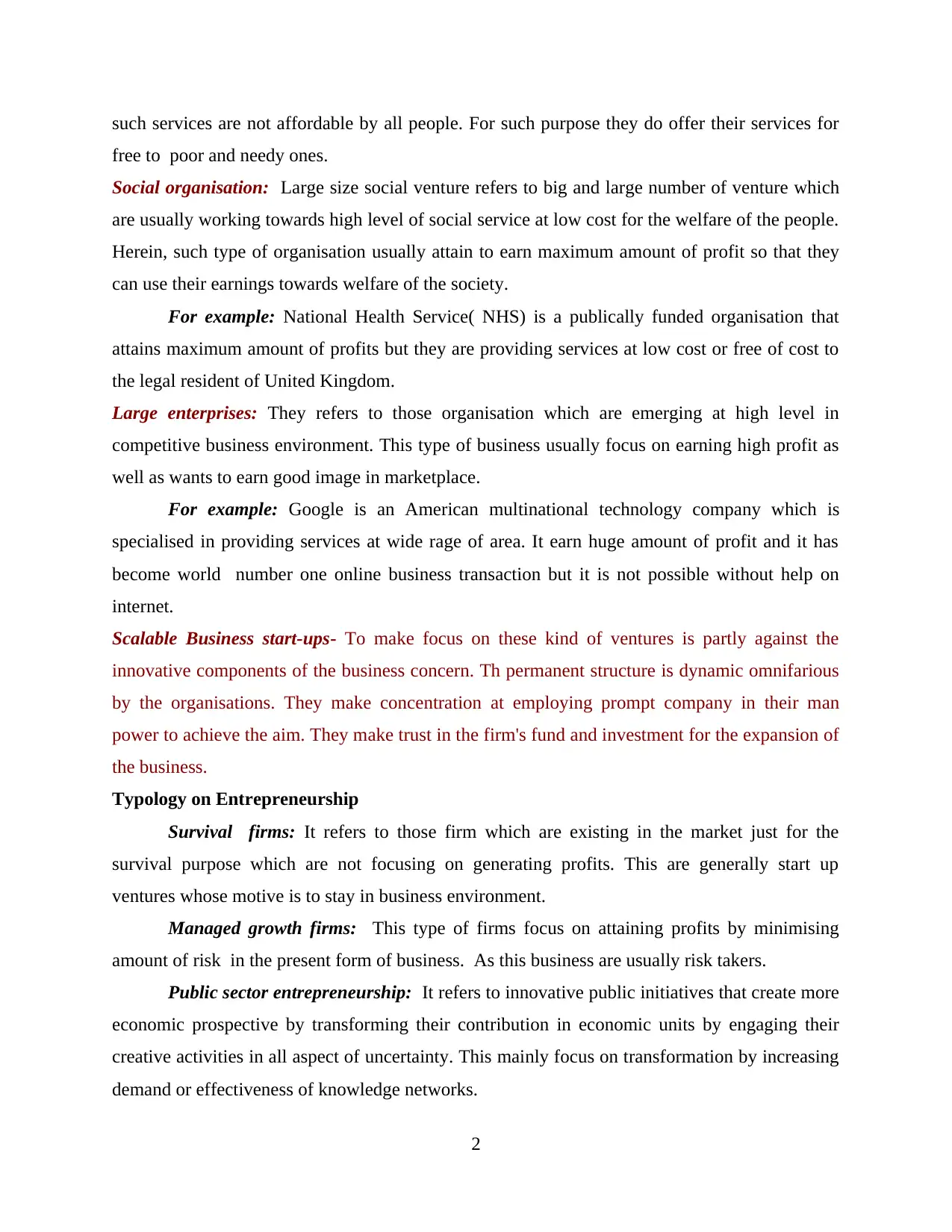
such services are not affordable by all people. For such purpose they do offer their services for
free to poor and needy ones.
Social organisation: Large size social venture refers to big and large number of venture which
are usually working towards high level of social service at low cost for the welfare of the people.
Herein, such type of organisation usually attain to earn maximum amount of profit so that they
can use their earnings towards welfare of the society.
For example: National Health Service( NHS) is a publically funded organisation that
attains maximum amount of profits but they are providing services at low cost or free of cost to
the legal resident of United Kingdom.
Large enterprises: They refers to those organisation which are emerging at high level in
competitive business environment. This type of business usually focus on earning high profit as
well as wants to earn good image in marketplace.
For example: Google is an American multinational technology company which is
specialised in providing services at wide rage of area. It earn huge amount of profit and it has
become world number one online business transaction but it is not possible without help on
internet.
Scalable Business start-ups- To make focus on these kind of ventures is partly against the
innovative components of the business concern. Th permanent structure is dynamic omnifarious
by the organisations. They make concentration at employing prompt company in their man
power to achieve the aim. They make trust in the firm's fund and investment for the expansion of
the business.
Typology on Entrepreneurship
Survival firms: It refers to those firm which are existing in the market just for the
survival purpose which are not focusing on generating profits. This are generally start up
ventures whose motive is to stay in business environment.
Managed growth firms: This type of firms focus on attaining profits by minimising
amount of risk in the present form of business. As this business are usually risk takers.
Public sector entrepreneurship: It refers to innovative public initiatives that create more
economic prospective by transforming their contribution in economic units by engaging their
creative activities in all aspect of uncertainty. This mainly focus on transformation by increasing
demand or effectiveness of knowledge networks.
2
free to poor and needy ones.
Social organisation: Large size social venture refers to big and large number of venture which
are usually working towards high level of social service at low cost for the welfare of the people.
Herein, such type of organisation usually attain to earn maximum amount of profit so that they
can use their earnings towards welfare of the society.
For example: National Health Service( NHS) is a publically funded organisation that
attains maximum amount of profits but they are providing services at low cost or free of cost to
the legal resident of United Kingdom.
Large enterprises: They refers to those organisation which are emerging at high level in
competitive business environment. This type of business usually focus on earning high profit as
well as wants to earn good image in marketplace.
For example: Google is an American multinational technology company which is
specialised in providing services at wide rage of area. It earn huge amount of profit and it has
become world number one online business transaction but it is not possible without help on
internet.
Scalable Business start-ups- To make focus on these kind of ventures is partly against the
innovative components of the business concern. Th permanent structure is dynamic omnifarious
by the organisations. They make concentration at employing prompt company in their man
power to achieve the aim. They make trust in the firm's fund and investment for the expansion of
the business.
Typology on Entrepreneurship
Survival firms: It refers to those firm which are existing in the market just for the
survival purpose which are not focusing on generating profits. This are generally start up
ventures whose motive is to stay in business environment.
Managed growth firms: This type of firms focus on attaining profits by minimising
amount of risk in the present form of business. As this business are usually risk takers.
Public sector entrepreneurship: It refers to innovative public initiatives that create more
economic prospective by transforming their contribution in economic units by engaging their
creative activities in all aspect of uncertainty. This mainly focus on transformation by increasing
demand or effectiveness of knowledge networks.
2
Paraphrase This Document
Need a fresh take? Get an instant paraphrase of this document with our AI Paraphraser
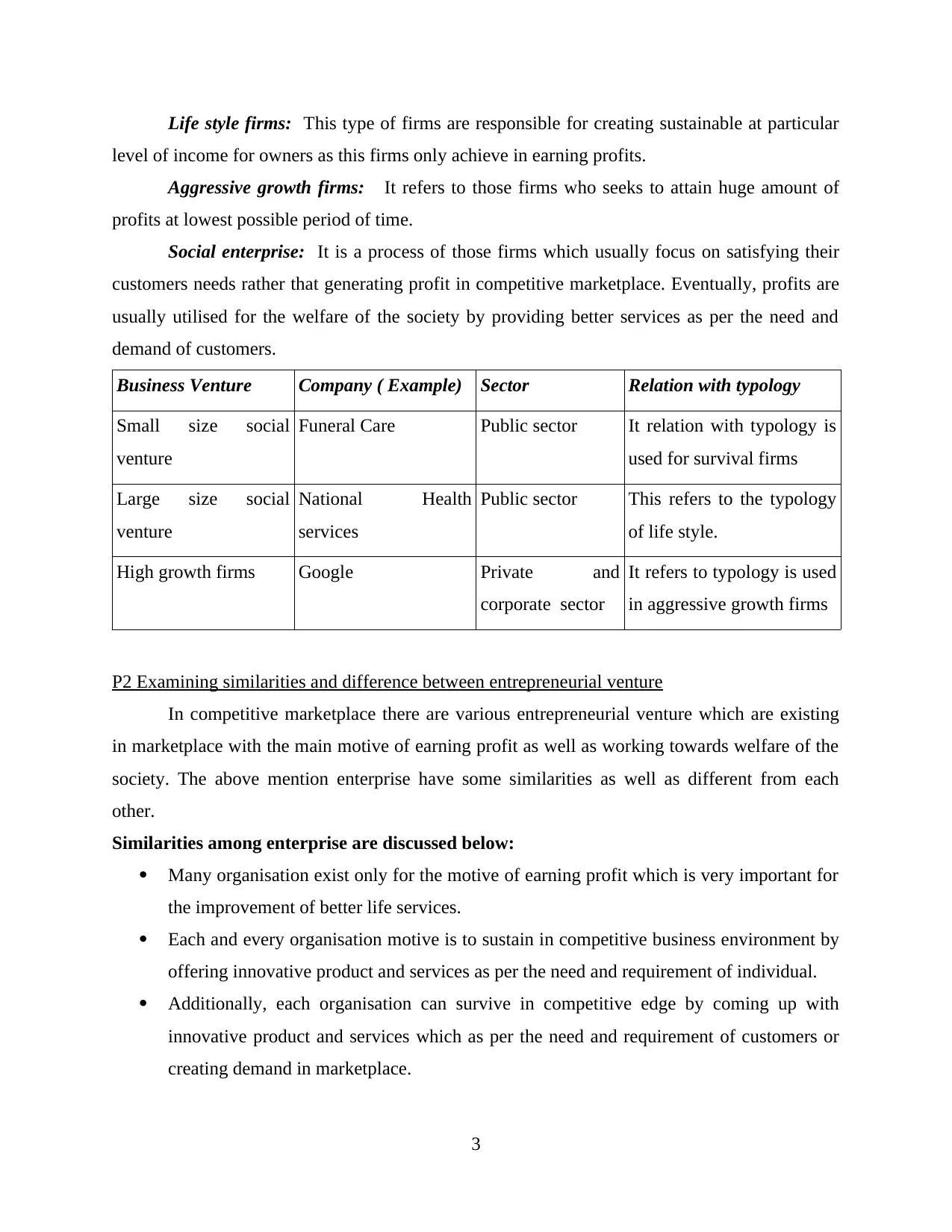
Life style firms: This type of firms are responsible for creating sustainable at particular
level of income for owners as this firms only achieve in earning profits.
Aggressive growth firms: It refers to those firms who seeks to attain huge amount of
profits at lowest possible period of time.
Social enterprise: It is a process of those firms which usually focus on satisfying their
customers needs rather that generating profit in competitive marketplace. Eventually, profits are
usually utilised for the welfare of the society by providing better services as per the need and
demand of customers.
Business Venture Company ( Example) Sector Relation with typology
Small size social
venture
Funeral Care Public sector It relation with typology is
used for survival firms
Large size social
venture
National Health
services
Public sector This refers to the typology
of life style.
High growth firms Google Private and
corporate sector
It refers to typology is used
in aggressive growth firms
P2 Examining similarities and difference between entrepreneurial venture
In competitive marketplace there are various entrepreneurial venture which are existing
in marketplace with the main motive of earning profit as well as working towards welfare of the
society. The above mention enterprise have some similarities as well as different from each
other.
Similarities among enterprise are discussed below:
Many organisation exist only for the motive of earning profit which is very important for
the improvement of better life services.
Each and every organisation motive is to sustain in competitive business environment by
offering innovative product and services as per the need and requirement of individual.
Additionally, each organisation can survive in competitive edge by coming up with
innovative product and services which as per the need and requirement of customers or
creating demand in marketplace.
3
level of income for owners as this firms only achieve in earning profits.
Aggressive growth firms: It refers to those firms who seeks to attain huge amount of
profits at lowest possible period of time.
Social enterprise: It is a process of those firms which usually focus on satisfying their
customers needs rather that generating profit in competitive marketplace. Eventually, profits are
usually utilised for the welfare of the society by providing better services as per the need and
demand of customers.
Business Venture Company ( Example) Sector Relation with typology
Small size social
venture
Funeral Care Public sector It relation with typology is
used for survival firms
Large size social
venture
National Health
services
Public sector This refers to the typology
of life style.
High growth firms Google Private and
corporate sector
It refers to typology is used
in aggressive growth firms
P2 Examining similarities and difference between entrepreneurial venture
In competitive marketplace there are various entrepreneurial venture which are existing
in marketplace with the main motive of earning profit as well as working towards welfare of the
society. The above mention enterprise have some similarities as well as different from each
other.
Similarities among enterprise are discussed below:
Many organisation exist only for the motive of earning profit which is very important for
the improvement of better life services.
Each and every organisation motive is to sustain in competitive business environment by
offering innovative product and services as per the need and requirement of individual.
Additionally, each organisation can survive in competitive edge by coming up with
innovative product and services which as per the need and requirement of customers or
creating demand in marketplace.
3
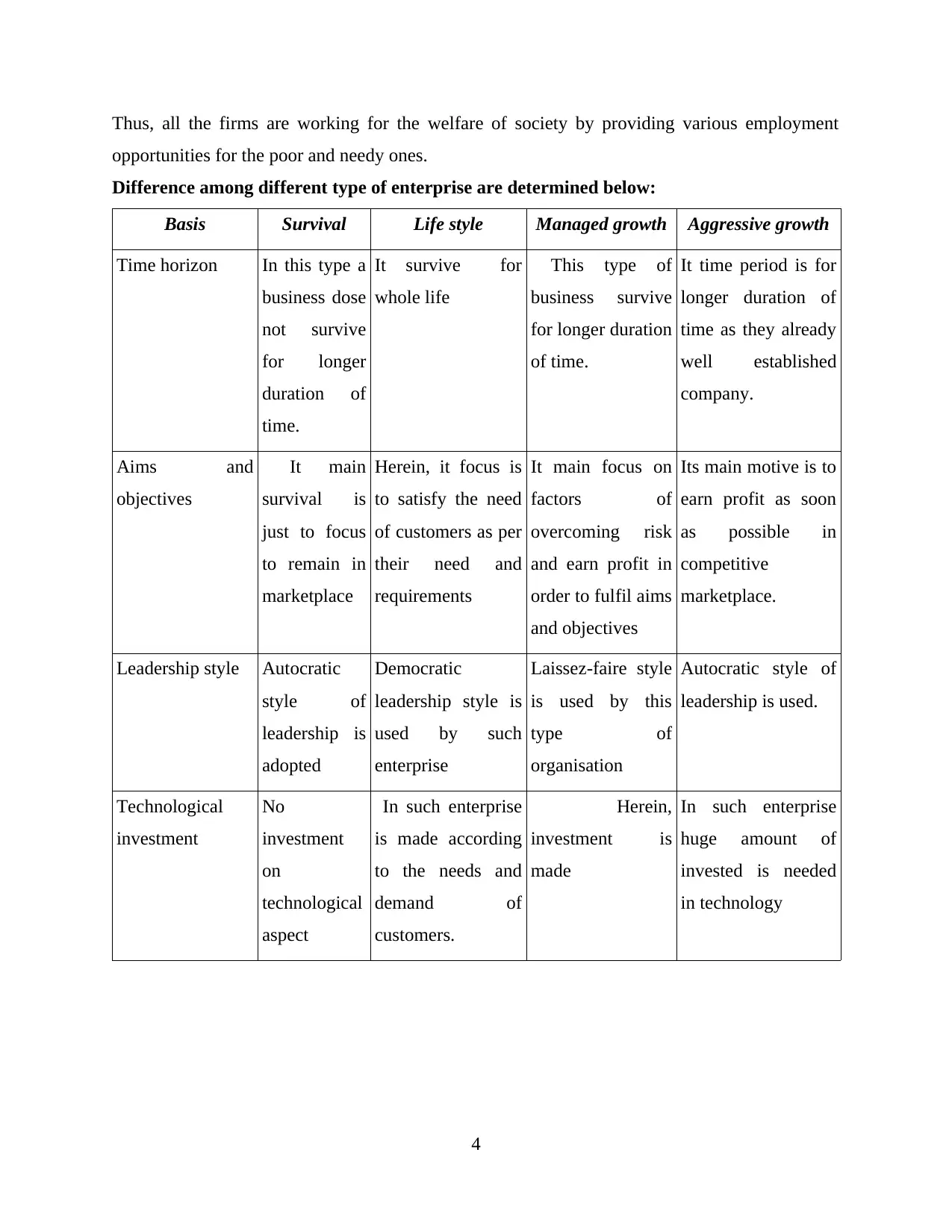
Thus, all the firms are working for the welfare of society by providing various employment
opportunities for the poor and needy ones.
Difference among different type of enterprise are determined below:
Basis Survival Life style Managed growth Aggressive growth
Time horizon In this type a
business dose
not survive
for longer
duration of
time.
It survive for
whole life
This type of
business survive
for longer duration
of time.
It time period is for
longer duration of
time as they already
well established
company.
Aims and
objectives
It main
survival is
just to focus
to remain in
marketplace
Herein, it focus is
to satisfy the need
of customers as per
their need and
requirements
It main focus on
factors of
overcoming risk
and earn profit in
order to fulfil aims
and objectives
Its main motive is to
earn profit as soon
as possible in
competitive
marketplace.
Leadership style Autocratic
style of
leadership is
adopted
Democratic
leadership style is
used by such
enterprise
Laissez-faire style
is used by this
type of
organisation
Autocratic style of
leadership is used.
Technological
investment
No
investment
on
technological
aspect
In such enterprise
is made according
to the needs and
demand of
customers.
Herein,
investment is
made
In such enterprise
huge amount of
invested is needed
in technology
4
opportunities for the poor and needy ones.
Difference among different type of enterprise are determined below:
Basis Survival Life style Managed growth Aggressive growth
Time horizon In this type a
business dose
not survive
for longer
duration of
time.
It survive for
whole life
This type of
business survive
for longer duration
of time.
It time period is for
longer duration of
time as they already
well established
company.
Aims and
objectives
It main
survival is
just to focus
to remain in
marketplace
Herein, it focus is
to satisfy the need
of customers as per
their need and
requirements
It main focus on
factors of
overcoming risk
and earn profit in
order to fulfil aims
and objectives
Its main motive is to
earn profit as soon
as possible in
competitive
marketplace.
Leadership style Autocratic
style of
leadership is
adopted
Democratic
leadership style is
used by such
enterprise
Laissez-faire style
is used by this
type of
organisation
Autocratic style of
leadership is used.
Technological
investment
No
investment
on
technological
aspect
In such enterprise
is made according
to the needs and
demand of
customers.
Herein,
investment is
made
In such enterprise
huge amount of
invested is needed
in technology
4
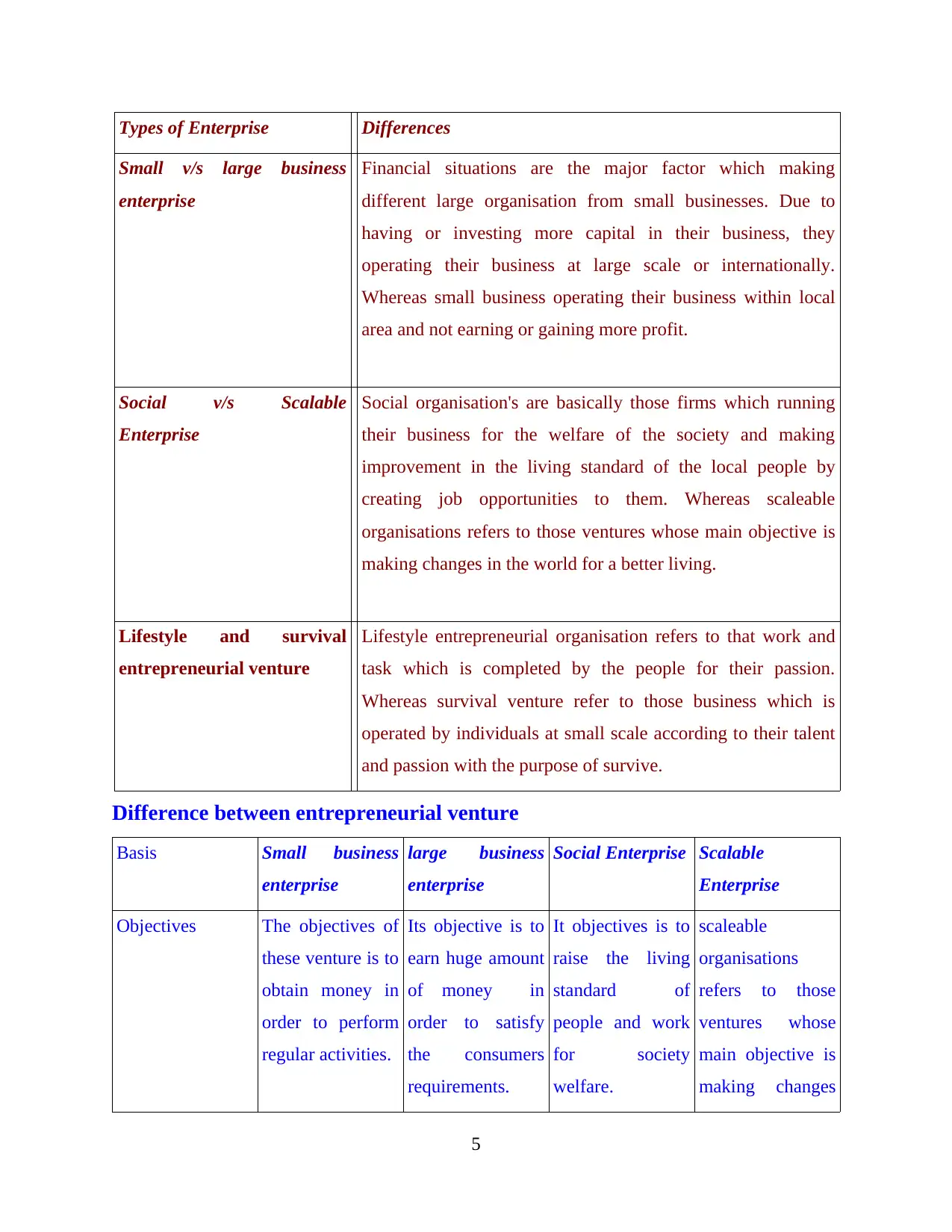
Types of Enterprise Differences
Small v/s large business
enterprise
Financial situations are the major factor which making
different large organisation from small businesses. Due to
having or investing more capital in their business, they
operating their business at large scale or internationally.
Whereas small business operating their business within local
area and not earning or gaining more profit.
Social v/s Scalable
Enterprise
Social organisation's are basically those firms which running
their business for the welfare of the society and making
improvement in the living standard of the local people by
creating job opportunities to them. Whereas scaleable
organisations refers to those ventures whose main objective is
making changes in the world for a better living.
Lifestyle and survival
entrepreneurial venture
Lifestyle entrepreneurial organisation refers to that work and
task which is completed by the people for their passion.
Whereas survival venture refer to those business which is
operated by individuals at small scale according to their talent
and passion with the purpose of survive.
Difference between entrepreneurial venture
Basis Small business
enterprise
large business
enterprise
Social Enterprise Scalable
Enterprise
Objectives The objectives of
these venture is to
obtain money in
order to perform
regular activities.
Its objective is to
earn huge amount
of money in
order to satisfy
the consumers
requirements.
It objectives is to
raise the living
standard of
people and work
for society
welfare.
scaleable
organisations
refers to those
ventures whose
main objective is
making changes
5
Small v/s large business
enterprise
Financial situations are the major factor which making
different large organisation from small businesses. Due to
having or investing more capital in their business, they
operating their business at large scale or internationally.
Whereas small business operating their business within local
area and not earning or gaining more profit.
Social v/s Scalable
Enterprise
Social organisation's are basically those firms which running
their business for the welfare of the society and making
improvement in the living standard of the local people by
creating job opportunities to them. Whereas scaleable
organisations refers to those ventures whose main objective is
making changes in the world for a better living.
Lifestyle and survival
entrepreneurial venture
Lifestyle entrepreneurial organisation refers to that work and
task which is completed by the people for their passion.
Whereas survival venture refer to those business which is
operated by individuals at small scale according to their talent
and passion with the purpose of survive.
Difference between entrepreneurial venture
Basis Small business
enterprise
large business
enterprise
Social Enterprise Scalable
Enterprise
Objectives The objectives of
these venture is to
obtain money in
order to perform
regular activities.
Its objective is to
earn huge amount
of money in
order to satisfy
the consumers
requirements.
It objectives is to
raise the living
standard of
people and work
for society
welfare.
scaleable
organisations
refers to those
ventures whose
main objective is
making changes
5
Secure Best Marks with AI Grader
Need help grading? Try our AI Grader for instant feedback on your assignments.
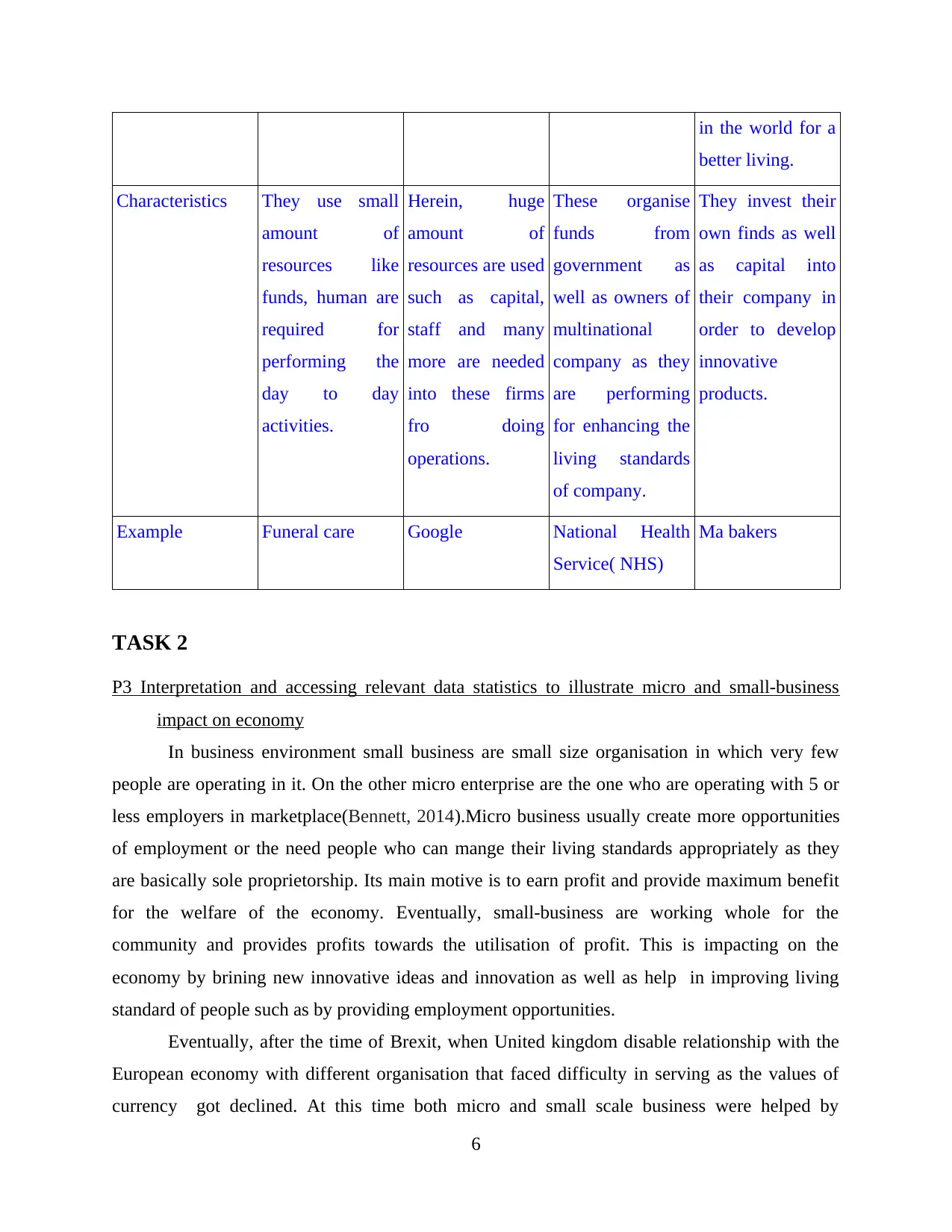
in the world for a
better living.
Characteristics They use small
amount of
resources like
funds, human are
required for
performing the
day to day
activities.
Herein, huge
amount of
resources are used
such as capital,
staff and many
more are needed
into these firms
fro doing
operations.
These organise
funds from
government as
well as owners of
multinational
company as they
are performing
for enhancing the
living standards
of company.
They invest their
own finds as well
as capital into
their company in
order to develop
innovative
products.
Example Funeral care Google National Health
Service( NHS)
Ma bakers
TASK 2
P3 Interpretation and accessing relevant data statistics to illustrate micro and small-business
impact on economy
In business environment small business are small size organisation in which very few
people are operating in it. On the other micro enterprise are the one who are operating with 5 or
less employers in marketplace(Bennett, 2014).Micro business usually create more opportunities
of employment or the need people who can mange their living standards appropriately as they
are basically sole proprietorship. Its main motive is to earn profit and provide maximum benefit
for the welfare of the economy. Eventually, small-business are working whole for the
community and provides profits towards the utilisation of profit. This is impacting on the
economy by brining new innovative ideas and innovation as well as help in improving living
standard of people such as by providing employment opportunities.
Eventually, after the time of Brexit, when United kingdom disable relationship with the
European economy with different organisation that faced difficulty in serving as the values of
currency got declined. At this time both micro and small scale business were helped by
6
better living.
Characteristics They use small
amount of
resources like
funds, human are
required for
performing the
day to day
activities.
Herein, huge
amount of
resources are used
such as capital,
staff and many
more are needed
into these firms
fro doing
operations.
These organise
funds from
government as
well as owners of
multinational
company as they
are performing
for enhancing the
living standards
of company.
They invest their
own finds as well
as capital into
their company in
order to develop
innovative
products.
Example Funeral care Google National Health
Service( NHS)
Ma bakers
TASK 2
P3 Interpretation and accessing relevant data statistics to illustrate micro and small-business
impact on economy
In business environment small business are small size organisation in which very few
people are operating in it. On the other micro enterprise are the one who are operating with 5 or
less employers in marketplace(Bennett, 2014).Micro business usually create more opportunities
of employment or the need people who can mange their living standards appropriately as they
are basically sole proprietorship. Its main motive is to earn profit and provide maximum benefit
for the welfare of the economy. Eventually, small-business are working whole for the
community and provides profits towards the utilisation of profit. This is impacting on the
economy by brining new innovative ideas and innovation as well as help in improving living
standard of people such as by providing employment opportunities.
Eventually, after the time of Brexit, when United kingdom disable relationship with the
European economy with different organisation that faced difficulty in serving as the values of
currency got declined. At this time both micro and small scale business were helped by
6

government of United kingdom in such difficult time. Herein, small scale contribution were era
about 65% for new employment opportunities. Thus, with the support of both micro and small
business are responsible in improving the economic welfare of the United Kingdom.
Illustration 1: Brexit’s impact on small businesses: the experts may be spot on after all
(Source: Brexit’s impact on small businesses: the experts may be spot on after all. 2019)
From the above stated graph it has been interpreted that both micro and small level
business are working towards welfare as well as providing contribution towards United kingdom
economy. As the above data clearly state that Scotland and Wales are part of United Kingdom
and its contribution towards the growth of economy. In case of Scotland it contribution is about
21.2% where as in case of Wales is near about 16.3%
7
about 65% for new employment opportunities. Thus, with the support of both micro and small
business are responsible in improving the economic welfare of the United Kingdom.
Illustration 1: Brexit’s impact on small businesses: the experts may be spot on after all
(Source: Brexit’s impact on small businesses: the experts may be spot on after all. 2019)
From the above stated graph it has been interpreted that both micro and small level
business are working towards welfare as well as providing contribution towards United kingdom
economy. As the above data clearly state that Scotland and Wales are part of United Kingdom
and its contribution towards the growth of economy. In case of Scotland it contribution is about
21.2% where as in case of Wales is near about 16.3%
7
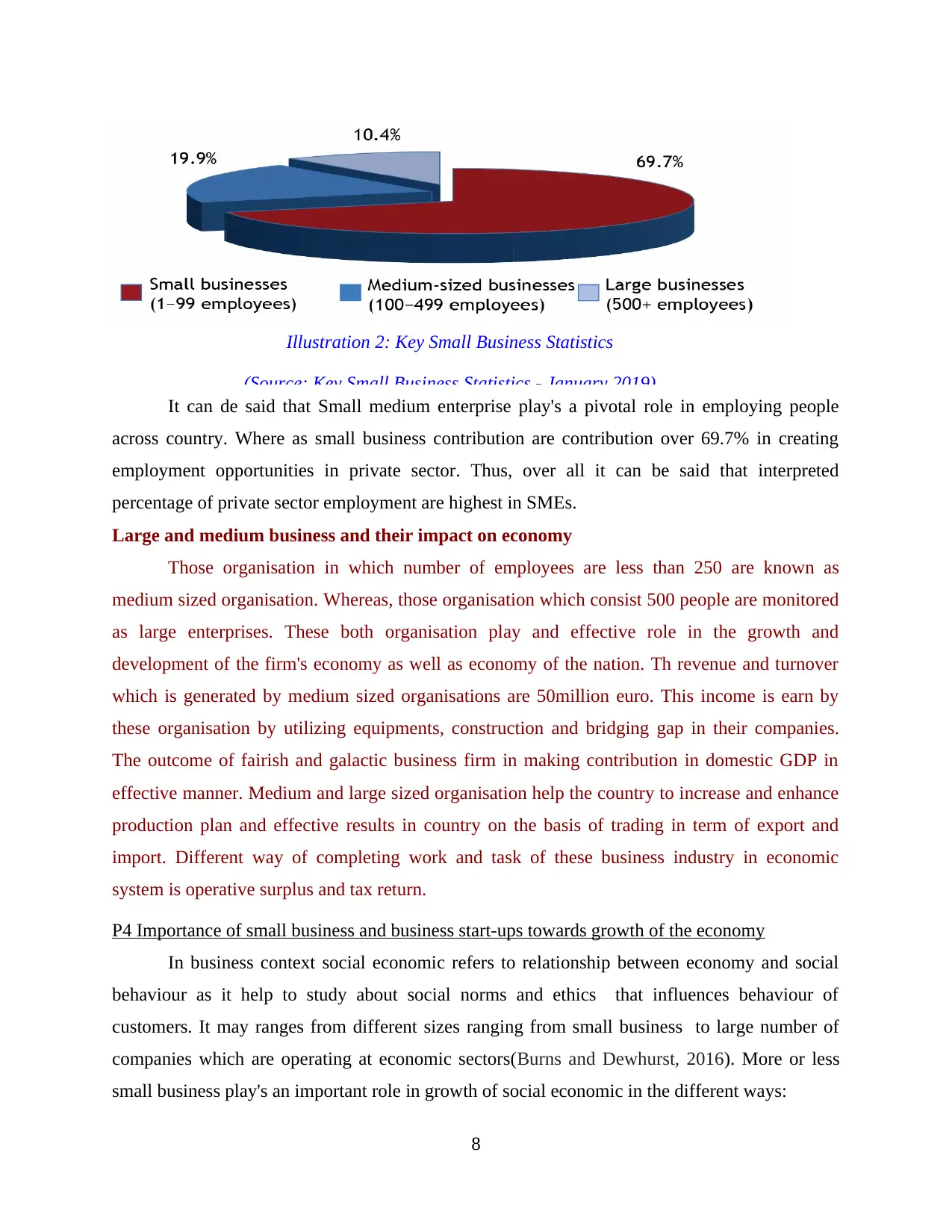
Illustration 2: Key Small Business Statistics
(Source: Key Small Business Statistics - January 2019)
It can de said that Small medium enterprise play's a pivotal role in employing people
across country. Where as small business contribution are contribution over 69.7% in creating
employment opportunities in private sector. Thus, over all it can be said that interpreted
percentage of private sector employment are highest in SMEs.
Large and medium business and their impact on economy
Those organisation in which number of employees are less than 250 are known as
medium sized organisation. Whereas, those organisation which consist 500 people are monitored
as large enterprises. These both organisation play and effective role in the growth and
development of the firm's economy as well as economy of the nation. Th revenue and turnover
which is generated by medium sized organisations are 50million euro. This income is earn by
these organisation by utilizing equipments, construction and bridging gap in their companies.
The outcome of fairish and galactic business firm in making contribution in domestic GDP in
effective manner. Medium and large sized organisation help the country to increase and enhance
production plan and effective results in country on the basis of trading in term of export and
import. Different way of completing work and task of these business industry in economic
system is operative surplus and tax return.
P4 Importance of small business and business start-ups towards growth of the economy
In business context social economic refers to relationship between economy and social
behaviour as it help to study about social norms and ethics that influences behaviour of
customers. It may ranges from different sizes ranging from small business to large number of
companies which are operating at economic sectors(Burns and Dewhurst, 2016). More or less
small business play's an important role in growth of social economic in the different ways:
8
(Source: Key Small Business Statistics - January 2019)
It can de said that Small medium enterprise play's a pivotal role in employing people
across country. Where as small business contribution are contribution over 69.7% in creating
employment opportunities in private sector. Thus, over all it can be said that interpreted
percentage of private sector employment are highest in SMEs.
Large and medium business and their impact on economy
Those organisation in which number of employees are less than 250 are known as
medium sized organisation. Whereas, those organisation which consist 500 people are monitored
as large enterprises. These both organisation play and effective role in the growth and
development of the firm's economy as well as economy of the nation. Th revenue and turnover
which is generated by medium sized organisations are 50million euro. This income is earn by
these organisation by utilizing equipments, construction and bridging gap in their companies.
The outcome of fairish and galactic business firm in making contribution in domestic GDP in
effective manner. Medium and large sized organisation help the country to increase and enhance
production plan and effective results in country on the basis of trading in term of export and
import. Different way of completing work and task of these business industry in economic
system is operative surplus and tax return.
P4 Importance of small business and business start-ups towards growth of the economy
In business context social economic refers to relationship between economy and social
behaviour as it help to study about social norms and ethics that influences behaviour of
customers. It may ranges from different sizes ranging from small business to large number of
companies which are operating at economic sectors(Burns and Dewhurst, 2016). More or less
small business play's an important role in growth of social economic in the different ways:
8
Paraphrase This Document
Need a fresh take? Get an instant paraphrase of this document with our AI Paraphraser
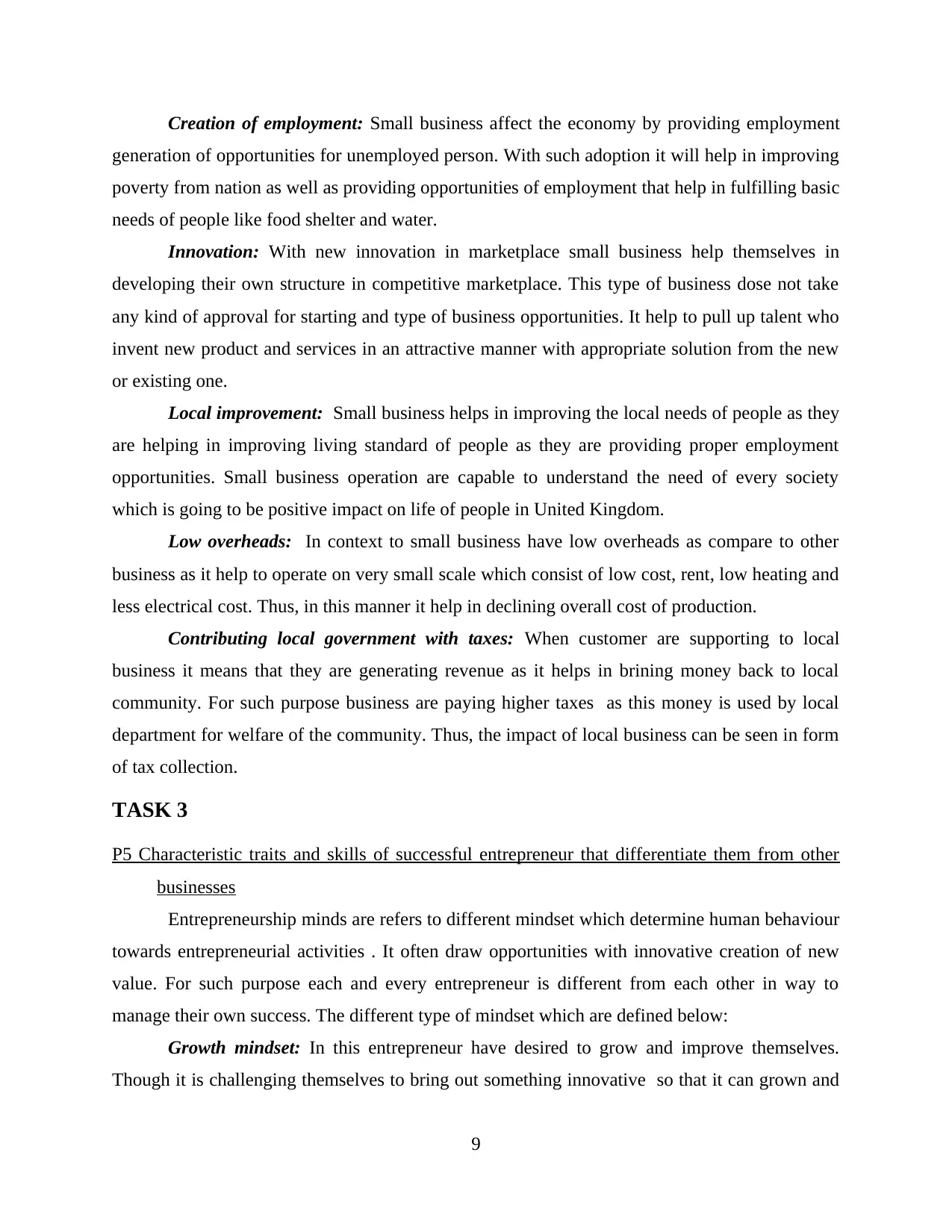
Creation of employment: Small business affect the economy by providing employment
generation of opportunities for unemployed person. With such adoption it will help in improving
poverty from nation as well as providing opportunities of employment that help in fulfilling basic
needs of people like food shelter and water.
Innovation: With new innovation in marketplace small business help themselves in
developing their own structure in competitive marketplace. This type of business dose not take
any kind of approval for starting and type of business opportunities. It help to pull up talent who
invent new product and services in an attractive manner with appropriate solution from the new
or existing one.
Local improvement: Small business helps in improving the local needs of people as they
are helping in improving living standard of people as they are providing proper employment
opportunities. Small business operation are capable to understand the need of every society
which is going to be positive impact on life of people in United Kingdom.
Low overheads: In context to small business have low overheads as compare to other
business as it help to operate on very small scale which consist of low cost, rent, low heating and
less electrical cost. Thus, in this manner it help in declining overall cost of production.
Contributing local government with taxes: When customer are supporting to local
business it means that they are generating revenue as it helps in brining money back to local
community. For such purpose business are paying higher taxes as this money is used by local
department for welfare of the community. Thus, the impact of local business can be seen in form
of tax collection.
TASK 3
P5 Characteristic traits and skills of successful entrepreneur that differentiate them from other
businesses
Entrepreneurship minds are refers to different mindset which determine human behaviour
towards entrepreneurial activities . It often draw opportunities with innovative creation of new
value. For such purpose each and every entrepreneur is different from each other in way to
manage their own success. The different type of mindset which are defined below:
Growth mindset: In this entrepreneur have desired to grow and improve themselves.
Though it is challenging themselves to bring out something innovative so that it can grown and
9
generation of opportunities for unemployed person. With such adoption it will help in improving
poverty from nation as well as providing opportunities of employment that help in fulfilling basic
needs of people like food shelter and water.
Innovation: With new innovation in marketplace small business help themselves in
developing their own structure in competitive marketplace. This type of business dose not take
any kind of approval for starting and type of business opportunities. It help to pull up talent who
invent new product and services in an attractive manner with appropriate solution from the new
or existing one.
Local improvement: Small business helps in improving the local needs of people as they
are helping in improving living standard of people as they are providing proper employment
opportunities. Small business operation are capable to understand the need of every society
which is going to be positive impact on life of people in United Kingdom.
Low overheads: In context to small business have low overheads as compare to other
business as it help to operate on very small scale which consist of low cost, rent, low heating and
less electrical cost. Thus, in this manner it help in declining overall cost of production.
Contributing local government with taxes: When customer are supporting to local
business it means that they are generating revenue as it helps in brining money back to local
community. For such purpose business are paying higher taxes as this money is used by local
department for welfare of the community. Thus, the impact of local business can be seen in form
of tax collection.
TASK 3
P5 Characteristic traits and skills of successful entrepreneur that differentiate them from other
businesses
Entrepreneurship minds are refers to different mindset which determine human behaviour
towards entrepreneurial activities . It often draw opportunities with innovative creation of new
value. For such purpose each and every entrepreneur is different from each other in way to
manage their own success. The different type of mindset which are defined below:
Growth mindset: In this entrepreneur have desired to grow and improve themselves.
Though it is challenging themselves to bring out something innovative so that it can grown and
9
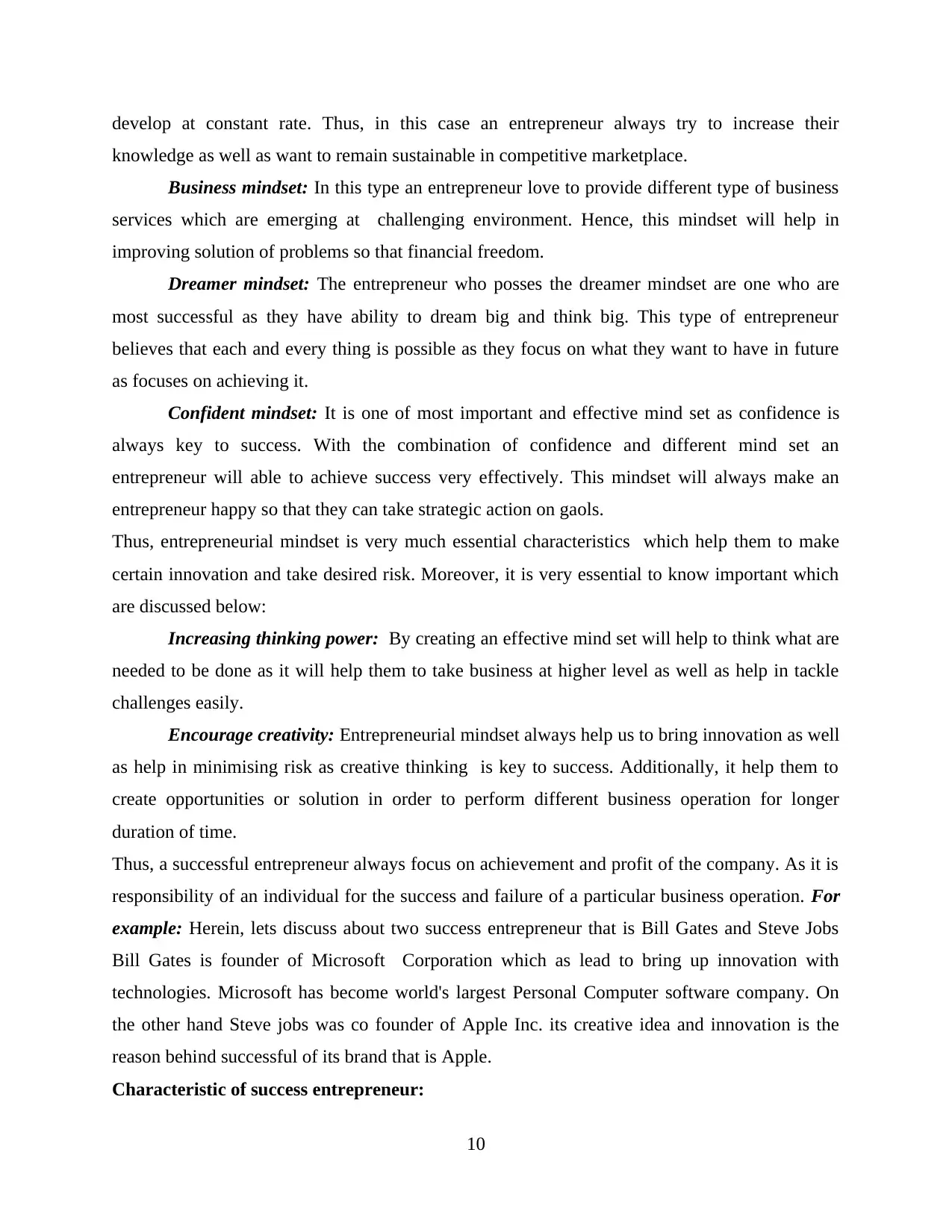
develop at constant rate. Thus, in this case an entrepreneur always try to increase their
knowledge as well as want to remain sustainable in competitive marketplace.
Business mindset: In this type an entrepreneur love to provide different type of business
services which are emerging at challenging environment. Hence, this mindset will help in
improving solution of problems so that financial freedom.
Dreamer mindset: The entrepreneur who posses the dreamer mindset are one who are
most successful as they have ability to dream big and think big. This type of entrepreneur
believes that each and every thing is possible as they focus on what they want to have in future
as focuses on achieving it.
Confident mindset: It is one of most important and effective mind set as confidence is
always key to success. With the combination of confidence and different mind set an
entrepreneur will able to achieve success very effectively. This mindset will always make an
entrepreneur happy so that they can take strategic action on gaols.
Thus, entrepreneurial mindset is very much essential characteristics which help them to make
certain innovation and take desired risk. Moreover, it is very essential to know important which
are discussed below:
Increasing thinking power: By creating an effective mind set will help to think what are
needed to be done as it will help them to take business at higher level as well as help in tackle
challenges easily.
Encourage creativity: Entrepreneurial mindset always help us to bring innovation as well
as help in minimising risk as creative thinking is key to success. Additionally, it help them to
create opportunities or solution in order to perform different business operation for longer
duration of time.
Thus, a successful entrepreneur always focus on achievement and profit of the company. As it is
responsibility of an individual for the success and failure of a particular business operation. For
example: Herein, lets discuss about two success entrepreneur that is Bill Gates and Steve Jobs
Bill Gates is founder of Microsoft Corporation which as lead to bring up innovation with
technologies. Microsoft has become world's largest Personal Computer software company. On
the other hand Steve jobs was co founder of Apple Inc. its creative idea and innovation is the
reason behind successful of its brand that is Apple.
Characteristic of success entrepreneur:
10
knowledge as well as want to remain sustainable in competitive marketplace.
Business mindset: In this type an entrepreneur love to provide different type of business
services which are emerging at challenging environment. Hence, this mindset will help in
improving solution of problems so that financial freedom.
Dreamer mindset: The entrepreneur who posses the dreamer mindset are one who are
most successful as they have ability to dream big and think big. This type of entrepreneur
believes that each and every thing is possible as they focus on what they want to have in future
as focuses on achieving it.
Confident mindset: It is one of most important and effective mind set as confidence is
always key to success. With the combination of confidence and different mind set an
entrepreneur will able to achieve success very effectively. This mindset will always make an
entrepreneur happy so that they can take strategic action on gaols.
Thus, entrepreneurial mindset is very much essential characteristics which help them to make
certain innovation and take desired risk. Moreover, it is very essential to know important which
are discussed below:
Increasing thinking power: By creating an effective mind set will help to think what are
needed to be done as it will help them to take business at higher level as well as help in tackle
challenges easily.
Encourage creativity: Entrepreneurial mindset always help us to bring innovation as well
as help in minimising risk as creative thinking is key to success. Additionally, it help them to
create opportunities or solution in order to perform different business operation for longer
duration of time.
Thus, a successful entrepreneur always focus on achievement and profit of the company. As it is
responsibility of an individual for the success and failure of a particular business operation. For
example: Herein, lets discuss about two success entrepreneur that is Bill Gates and Steve Jobs
Bill Gates is founder of Microsoft Corporation which as lead to bring up innovation with
technologies. Microsoft has become world's largest Personal Computer software company. On
the other hand Steve jobs was co founder of Apple Inc. its creative idea and innovation is the
reason behind successful of its brand that is Apple.
Characteristic of success entrepreneur:
10
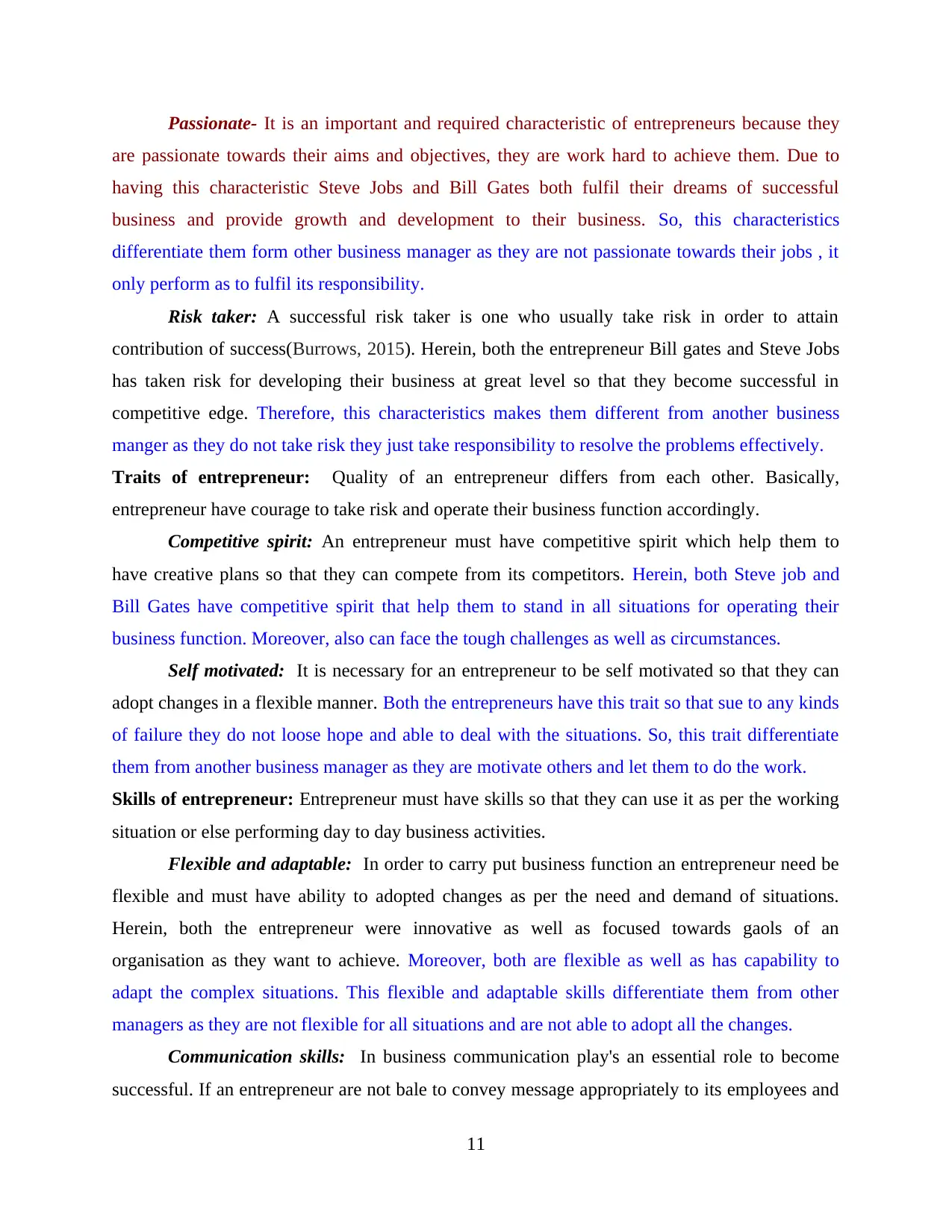
Passionate- It is an important and required characteristic of entrepreneurs because they
are passionate towards their aims and objectives, they are work hard to achieve them. Due to
having this characteristic Steve Jobs and Bill Gates both fulfil their dreams of successful
business and provide growth and development to their business. So, this characteristics
differentiate them form other business manager as they are not passionate towards their jobs , it
only perform as to fulfil its responsibility.
Risk taker: A successful risk taker is one who usually take risk in order to attain
contribution of success(Burrows, 2015). Herein, both the entrepreneur Bill gates and Steve Jobs
has taken risk for developing their business at great level so that they become successful in
competitive edge. Therefore, this characteristics makes them different from another business
manger as they do not take risk they just take responsibility to resolve the problems effectively.
Traits of entrepreneur: Quality of an entrepreneur differs from each other. Basically,
entrepreneur have courage to take risk and operate their business function accordingly.
Competitive spirit: An entrepreneur must have competitive spirit which help them to
have creative plans so that they can compete from its competitors. Herein, both Steve job and
Bill Gates have competitive spirit that help them to stand in all situations for operating their
business function. Moreover, also can face the tough challenges as well as circumstances.
Self motivated: It is necessary for an entrepreneur to be self motivated so that they can
adopt changes in a flexible manner. Both the entrepreneurs have this trait so that sue to any kinds
of failure they do not loose hope and able to deal with the situations. So, this trait differentiate
them from another business manager as they are motivate others and let them to do the work.
Skills of entrepreneur: Entrepreneur must have skills so that they can use it as per the working
situation or else performing day to day business activities.
Flexible and adaptable: In order to carry put business function an entrepreneur need be
flexible and must have ability to adopted changes as per the need and demand of situations.
Herein, both the entrepreneur were innovative as well as focused towards gaols of an
organisation as they want to achieve. Moreover, both are flexible as well as has capability to
adapt the complex situations. This flexible and adaptable skills differentiate them from other
managers as they are not flexible for all situations and are not able to adopt all the changes.
Communication skills: In business communication play's an essential role to become
successful. If an entrepreneur are not bale to convey message appropriately to its employees and
11
are passionate towards their aims and objectives, they are work hard to achieve them. Due to
having this characteristic Steve Jobs and Bill Gates both fulfil their dreams of successful
business and provide growth and development to their business. So, this characteristics
differentiate them form other business manager as they are not passionate towards their jobs , it
only perform as to fulfil its responsibility.
Risk taker: A successful risk taker is one who usually take risk in order to attain
contribution of success(Burrows, 2015). Herein, both the entrepreneur Bill gates and Steve Jobs
has taken risk for developing their business at great level so that they become successful in
competitive edge. Therefore, this characteristics makes them different from another business
manger as they do not take risk they just take responsibility to resolve the problems effectively.
Traits of entrepreneur: Quality of an entrepreneur differs from each other. Basically,
entrepreneur have courage to take risk and operate their business function accordingly.
Competitive spirit: An entrepreneur must have competitive spirit which help them to
have creative plans so that they can compete from its competitors. Herein, both Steve job and
Bill Gates have competitive spirit that help them to stand in all situations for operating their
business function. Moreover, also can face the tough challenges as well as circumstances.
Self motivated: It is necessary for an entrepreneur to be self motivated so that they can
adopt changes in a flexible manner. Both the entrepreneurs have this trait so that sue to any kinds
of failure they do not loose hope and able to deal with the situations. So, this trait differentiate
them from another business manager as they are motivate others and let them to do the work.
Skills of entrepreneur: Entrepreneur must have skills so that they can use it as per the working
situation or else performing day to day business activities.
Flexible and adaptable: In order to carry put business function an entrepreneur need be
flexible and must have ability to adopted changes as per the need and demand of situations.
Herein, both the entrepreneur were innovative as well as focused towards gaols of an
organisation as they want to achieve. Moreover, both are flexible as well as has capability to
adapt the complex situations. This flexible and adaptable skills differentiate them from other
managers as they are not flexible for all situations and are not able to adopt all the changes.
Communication skills: In business communication play's an essential role to become
successful. If an entrepreneur are not bale to convey message appropriately to its employees and
11
Secure Best Marks with AI Grader
Need help grading? Try our AI Grader for instant feedback on your assignments.
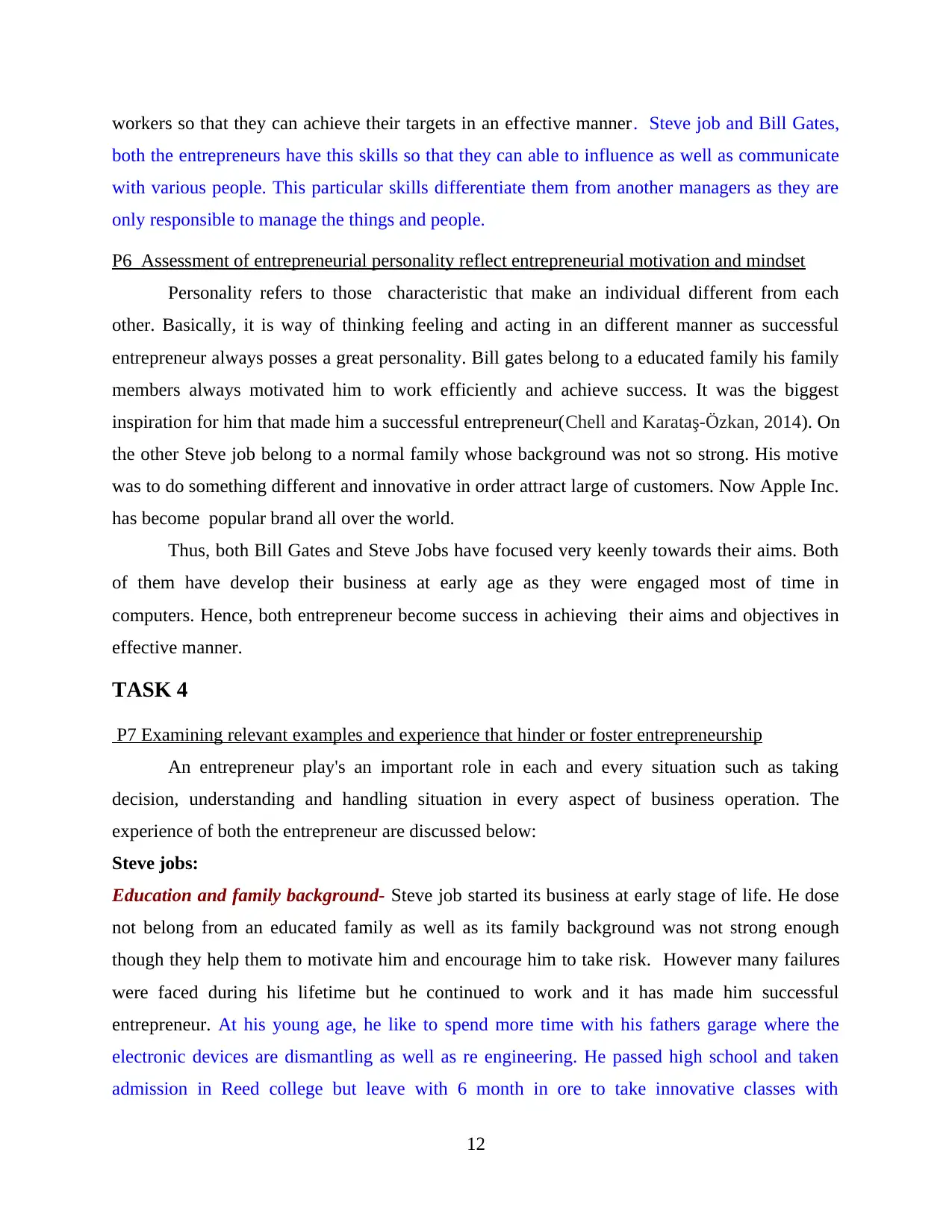
workers so that they can achieve their targets in an effective manner. Steve job and Bill Gates,
both the entrepreneurs have this skills so that they can able to influence as well as communicate
with various people. This particular skills differentiate them from another managers as they are
only responsible to manage the things and people.
P6 Assessment of entrepreneurial personality reflect entrepreneurial motivation and mindset
Personality refers to those characteristic that make an individual different from each
other. Basically, it is way of thinking feeling and acting in an different manner as successful
entrepreneur always posses a great personality. Bill gates belong to a educated family his family
members always motivated him to work efficiently and achieve success. It was the biggest
inspiration for him that made him a successful entrepreneur(Chell and Karataş-Özkan, 2014). On
the other Steve job belong to a normal family whose background was not so strong. His motive
was to do something different and innovative in order attract large of customers. Now Apple Inc.
has become popular brand all over the world.
Thus, both Bill Gates and Steve Jobs have focused very keenly towards their aims. Both
of them have develop their business at early age as they were engaged most of time in
computers. Hence, both entrepreneur become success in achieving their aims and objectives in
effective manner.
TASK 4
P7 Examining relevant examples and experience that hinder or foster entrepreneurship
An entrepreneur play's an important role in each and every situation such as taking
decision, understanding and handling situation in every aspect of business operation. The
experience of both the entrepreneur are discussed below:
Steve jobs:
Education and family background- Steve job started its business at early stage of life. He dose
not belong from an educated family as well as its family background was not strong enough
though they help them to motivate him and encourage him to take risk. However many failures
were faced during his lifetime but he continued to work and it has made him successful
entrepreneur. At his young age, he like to spend more time with his fathers garage where the
electronic devices are dismantling as well as re engineering. He passed high school and taken
admission in Reed college but leave with 6 month in ore to take innovative classes with
12
both the entrepreneurs have this skills so that they can able to influence as well as communicate
with various people. This particular skills differentiate them from another managers as they are
only responsible to manage the things and people.
P6 Assessment of entrepreneurial personality reflect entrepreneurial motivation and mindset
Personality refers to those characteristic that make an individual different from each
other. Basically, it is way of thinking feeling and acting in an different manner as successful
entrepreneur always posses a great personality. Bill gates belong to a educated family his family
members always motivated him to work efficiently and achieve success. It was the biggest
inspiration for him that made him a successful entrepreneur(Chell and Karataş-Özkan, 2014). On
the other Steve job belong to a normal family whose background was not so strong. His motive
was to do something different and innovative in order attract large of customers. Now Apple Inc.
has become popular brand all over the world.
Thus, both Bill Gates and Steve Jobs have focused very keenly towards their aims. Both
of them have develop their business at early age as they were engaged most of time in
computers. Hence, both entrepreneur become success in achieving their aims and objectives in
effective manner.
TASK 4
P7 Examining relevant examples and experience that hinder or foster entrepreneurship
An entrepreneur play's an important role in each and every situation such as taking
decision, understanding and handling situation in every aspect of business operation. The
experience of both the entrepreneur are discussed below:
Steve jobs:
Education and family background- Steve job started its business at early stage of life. He dose
not belong from an educated family as well as its family background was not strong enough
though they help them to motivate him and encourage him to take risk. However many failures
were faced during his lifetime but he continued to work and it has made him successful
entrepreneur. At his young age, he like to spend more time with his fathers garage where the
electronic devices are dismantling as well as re engineering. He passed high school and taken
admission in Reed college but leave with 6 month in ore to take innovative classes with
12
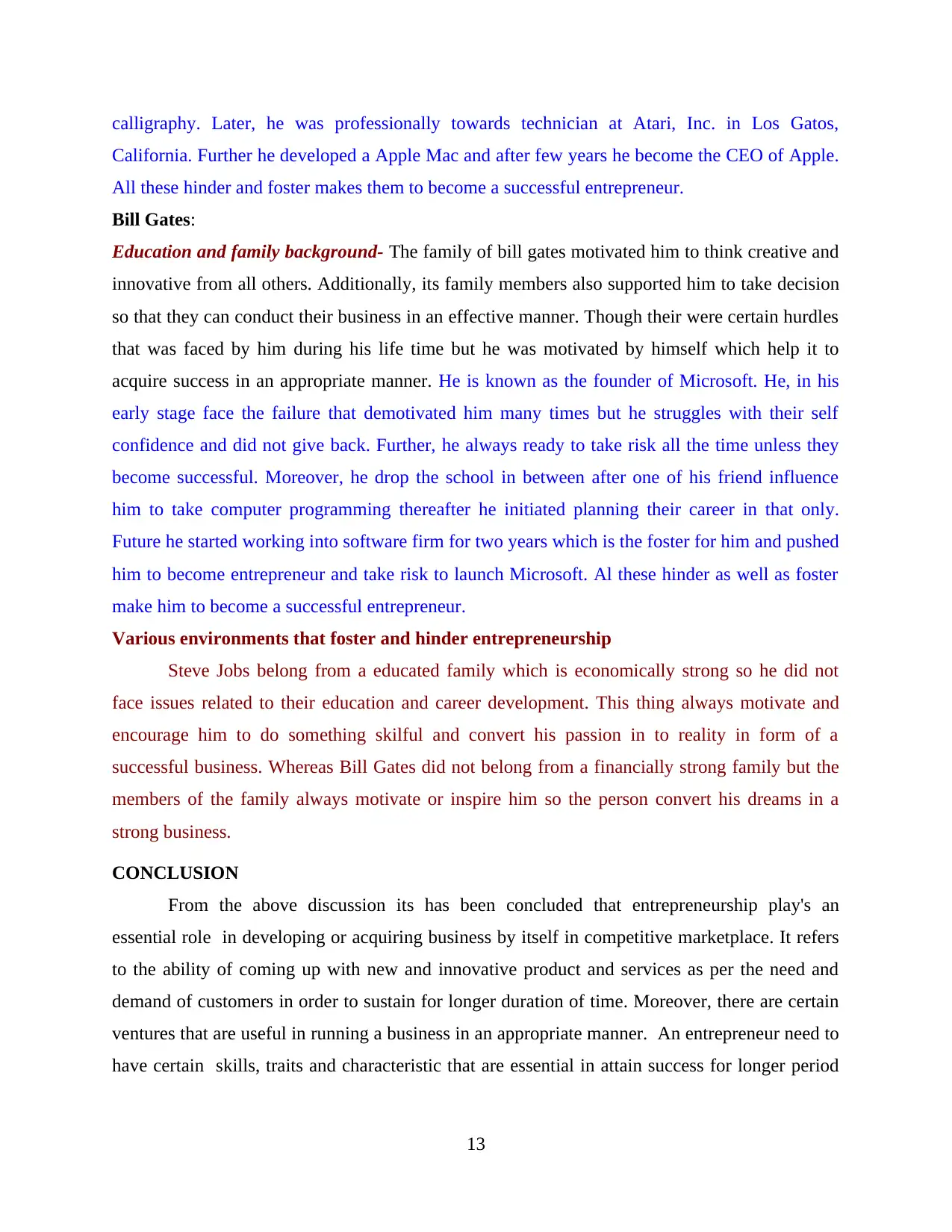
calligraphy. Later, he was professionally towards technician at Atari, Inc. in Los Gatos,
California. Further he developed a Apple Mac and after few years he become the CEO of Apple.
All these hinder and foster makes them to become a successful entrepreneur.
Bill Gates:
Education and family background- The family of bill gates motivated him to think creative and
innovative from all others. Additionally, its family members also supported him to take decision
so that they can conduct their business in an effective manner. Though their were certain hurdles
that was faced by him during his life time but he was motivated by himself which help it to
acquire success in an appropriate manner. He is known as the founder of Microsoft. He, in his
early stage face the failure that demotivated him many times but he struggles with their self
confidence and did not give back. Further, he always ready to take risk all the time unless they
become successful. Moreover, he drop the school in between after one of his friend influence
him to take computer programming thereafter he initiated planning their career in that only.
Future he started working into software firm for two years which is the foster for him and pushed
him to become entrepreneur and take risk to launch Microsoft. Al these hinder as well as foster
make him to become a successful entrepreneur.
Various environments that foster and hinder entrepreneurship
Steve Jobs belong from a educated family which is economically strong so he did not
face issues related to their education and career development. This thing always motivate and
encourage him to do something skilful and convert his passion in to reality in form of a
successful business. Whereas Bill Gates did not belong from a financially strong family but the
members of the family always motivate or inspire him so the person convert his dreams in a
strong business.
CONCLUSION
From the above discussion its has been concluded that entrepreneurship play's an
essential role in developing or acquiring business by itself in competitive marketplace. It refers
to the ability of coming up with new and innovative product and services as per the need and
demand of customers in order to sustain for longer duration of time. Moreover, there are certain
ventures that are useful in running a business in an appropriate manner. An entrepreneur need to
have certain skills, traits and characteristic that are essential in attain success for longer period
13
California. Further he developed a Apple Mac and after few years he become the CEO of Apple.
All these hinder and foster makes them to become a successful entrepreneur.
Bill Gates:
Education and family background- The family of bill gates motivated him to think creative and
innovative from all others. Additionally, its family members also supported him to take decision
so that they can conduct their business in an effective manner. Though their were certain hurdles
that was faced by him during his life time but he was motivated by himself which help it to
acquire success in an appropriate manner. He is known as the founder of Microsoft. He, in his
early stage face the failure that demotivated him many times but he struggles with their self
confidence and did not give back. Further, he always ready to take risk all the time unless they
become successful. Moreover, he drop the school in between after one of his friend influence
him to take computer programming thereafter he initiated planning their career in that only.
Future he started working into software firm for two years which is the foster for him and pushed
him to become entrepreneur and take risk to launch Microsoft. Al these hinder as well as foster
make him to become a successful entrepreneur.
Various environments that foster and hinder entrepreneurship
Steve Jobs belong from a educated family which is economically strong so he did not
face issues related to their education and career development. This thing always motivate and
encourage him to do something skilful and convert his passion in to reality in form of a
successful business. Whereas Bill Gates did not belong from a financially strong family but the
members of the family always motivate or inspire him so the person convert his dreams in a
strong business.
CONCLUSION
From the above discussion its has been concluded that entrepreneurship play's an
essential role in developing or acquiring business by itself in competitive marketplace. It refers
to the ability of coming up with new and innovative product and services as per the need and
demand of customers in order to sustain for longer duration of time. Moreover, there are certain
ventures that are useful in running a business in an appropriate manner. An entrepreneur need to
have certain skills, traits and characteristic that are essential in attain success for longer period
13

of time. Thus, it can be said that entrepreneur play's an essential role in boosting up economy as
well as increasing per capita income for an organisation in an effective manner.
14
well as increasing per capita income for an organisation in an effective manner.
14
Paraphrase This Document
Need a fresh take? Get an instant paraphrase of this document with our AI Paraphraser
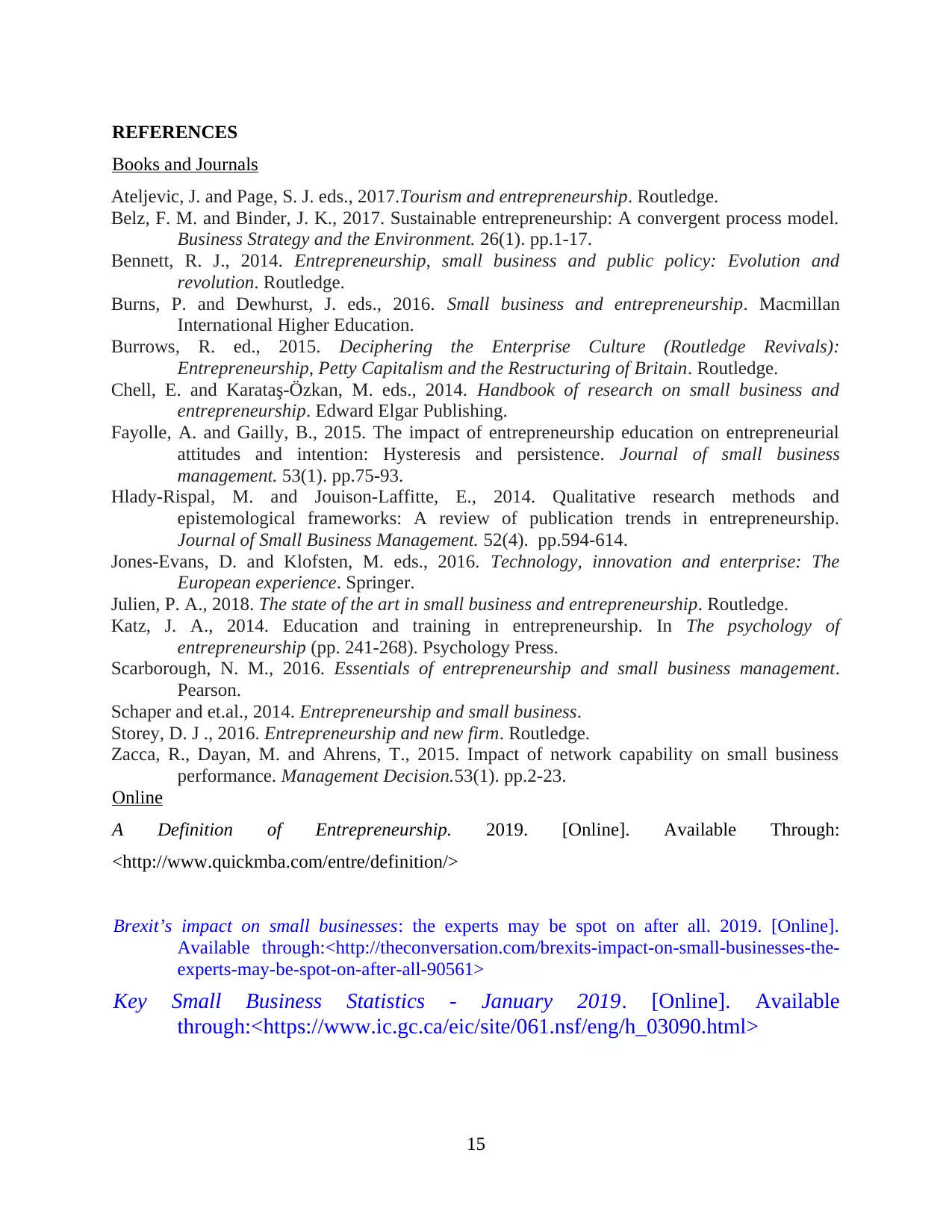
REFERENCES
Books and Journals
Ateljevic, J. and Page, S. J. eds., 2017.Tourism and entrepreneurship. Routledge.
Belz, F. M. and Binder, J. K., 2017. Sustainable entrepreneurship: A convergent process model.
Business Strategy and the Environment. 26(1). pp.1-17.
Bennett, R. J., 2014. Entrepreneurship, small business and public policy: Evolution and
revolution. Routledge.
Burns, P. and Dewhurst, J. eds., 2016. Small business and entrepreneurship. Macmillan
International Higher Education.
Burrows, R. ed., 2015. Deciphering the Enterprise Culture (Routledge Revivals):
Entrepreneurship, Petty Capitalism and the Restructuring of Britain. Routledge.
Chell, E. and Karataş-Özkan, M. eds., 2014. Handbook of research on small business and
entrepreneurship. Edward Elgar Publishing.
Fayolle, A. and Gailly, B., 2015. The impact of entrepreneurship education on entrepreneurial
attitudes and intention: Hysteresis and persistence. Journal of small business
management. 53(1). pp.75-93.
Hlady‐Rispal, M. and Jouison‐Laffitte, E., 2014. Qualitative research methods and
epistemological frameworks: A review of publication trends in entrepreneurship.
Journal of Small Business Management. 52(4). pp.594-614.
Jones-Evans, D. and Klofsten, M. eds., 2016. Technology, innovation and enterprise: The
European experience. Springer.
Julien, P. A., 2018. The state of the art in small business and entrepreneurship. Routledge.
Katz, J. A., 2014. Education and training in entrepreneurship. In The psychology of
entrepreneurship (pp. 241-268). Psychology Press.
Scarborough, N. M., 2016. Essentials of entrepreneurship and small business management.
Pearson.
Schaper and et.al., 2014. Entrepreneurship and small business.
Storey, D. J ., 2016. Entrepreneurship and new firm. Routledge.
Zacca, R., Dayan, M. and Ahrens, T., 2015. Impact of network capability on small business
performance. Management Decision.53(1). pp.2-23.
Online
A Definition of Entrepreneurship. 2019. [Online]. Available Through:
<http://www.quickmba.com/entre/definition/>
Brexit’s impact on small businesses: the experts may be spot on after all. 2019. [Online].
Available through:<http://theconversation.com/brexits-impact-on-small-businesses-the-
experts-may-be-spot-on-after-all-90561>
Key Small Business Statistics - January 2019. [Online]. Available
through:<https://www.ic.gc.ca/eic/site/061.nsf/eng/h_03090.html>
15
Books and Journals
Ateljevic, J. and Page, S. J. eds., 2017.Tourism and entrepreneurship. Routledge.
Belz, F. M. and Binder, J. K., 2017. Sustainable entrepreneurship: A convergent process model.
Business Strategy and the Environment. 26(1). pp.1-17.
Bennett, R. J., 2014. Entrepreneurship, small business and public policy: Evolution and
revolution. Routledge.
Burns, P. and Dewhurst, J. eds., 2016. Small business and entrepreneurship. Macmillan
International Higher Education.
Burrows, R. ed., 2015. Deciphering the Enterprise Culture (Routledge Revivals):
Entrepreneurship, Petty Capitalism and the Restructuring of Britain. Routledge.
Chell, E. and Karataş-Özkan, M. eds., 2014. Handbook of research on small business and
entrepreneurship. Edward Elgar Publishing.
Fayolle, A. and Gailly, B., 2015. The impact of entrepreneurship education on entrepreneurial
attitudes and intention: Hysteresis and persistence. Journal of small business
management. 53(1). pp.75-93.
Hlady‐Rispal, M. and Jouison‐Laffitte, E., 2014. Qualitative research methods and
epistemological frameworks: A review of publication trends in entrepreneurship.
Journal of Small Business Management. 52(4). pp.594-614.
Jones-Evans, D. and Klofsten, M. eds., 2016. Technology, innovation and enterprise: The
European experience. Springer.
Julien, P. A., 2018. The state of the art in small business and entrepreneurship. Routledge.
Katz, J. A., 2014. Education and training in entrepreneurship. In The psychology of
entrepreneurship (pp. 241-268). Psychology Press.
Scarborough, N. M., 2016. Essentials of entrepreneurship and small business management.
Pearson.
Schaper and et.al., 2014. Entrepreneurship and small business.
Storey, D. J ., 2016. Entrepreneurship and new firm. Routledge.
Zacca, R., Dayan, M. and Ahrens, T., 2015. Impact of network capability on small business
performance. Management Decision.53(1). pp.2-23.
Online
A Definition of Entrepreneurship. 2019. [Online]. Available Through:
<http://www.quickmba.com/entre/definition/>
Brexit’s impact on small businesses: the experts may be spot on after all. 2019. [Online].
Available through:<http://theconversation.com/brexits-impact-on-small-businesses-the-
experts-may-be-spot-on-after-all-90561>
Key Small Business Statistics - January 2019. [Online]. Available
through:<https://www.ic.gc.ca/eic/site/061.nsf/eng/h_03090.html>
15
1 out of 17
Related Documents
Your All-in-One AI-Powered Toolkit for Academic Success.
+13062052269
info@desklib.com
Available 24*7 on WhatsApp / Email
![[object Object]](/_next/static/media/star-bottom.7253800d.svg)
Unlock your academic potential
© 2024 | Zucol Services PVT LTD | All rights reserved.





